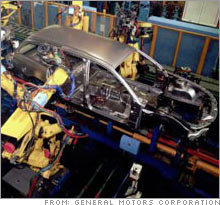GM profitable but misses forecastsNo. 1 automaker reports near break-even results in key auto operations but is hit by subprime mortgage problems.NEW YORK (CNNMoney.com) -- General Motors reversed a year-earlier loss to post a profit Wednesday, but it badly missed Wall Street forecasts, as a big improvement at its core North American auto operations was partly offset subprime woes as its suddenly troubled home mortgage business saw a $661 million loss. Kevin Tynan, auto analyst with Argus Research, said auto earnings were a bit better than he had expected, but that worries about subprime mortgages could weigh on shares Wednesday.
Shares of Dow component GM (Charts) were down more than 1 percent in late-morning trading after the report and its conference call with investors and analysts. "It's almost like, 'Now what?' We're starting to get automotive together, and we have to deal with problems in what has been the cornerstone of earnings going back for years," Tynan said. The world's No. 1 automaker posted net income of $950 million, or $1.68, but that was helped by the sale of 51 percent of its GMAC finance arm during the period. Excluding special items, earnings came in at $180 million, or 32 cents a share, a big improvement from the loss of $936 million, or $1.66 per share, on that basis a year earlier, but well below the $1.19 a share that analysts surveyed by earnings tracker First Call had been forecasting. The company's North American auto operations nearly broke even in the fourth quarter, reporting a net loss of $14 million versus an adjusted loss of $1.4 billion a year earlier. GM officials said they were pleased by the improvement in North American auto operations but said there are still challenges ahead. "It's also validation that our strategy is working, and faster than many people thought possible," said a statement from GM Chairman Rick Wagoner. "But nobody at GM is declaring victory, because we all know there is still a lot more work to do to achieve our goals of steady growth, solid profitability and positive cash flow generation." The company also posted a narrow loss of $8 million on its European auto operations, compared to a $5 million profit a year earlier. But earnings from Latin America, Africa and the Middle East more than doubled to $128 million, and earnings from the Asia Pacific region was little changed at $122 million. That allowed the company's overall auto operations to post income excluding items of $228 million, compared to a loss of $1.2 billion on that basis a year earlier. Sales from autos posted an unexpected gain, coming in at $44 billion, up from $42.9 billion a year earlier. First Call's forecast was for that revenue to slip to $41.5 billion. Overall revenue came in at $51.2 billion, including two months of revenue at GMAC before the sale closed. On a stand alone basis, GMAC saw its operating income fall by just more than half to $225 million in the fourth quarter. That was due primarily due to a loss of $661 million from its residential mortgage business. GMAC posted a profit of $118 million from that business line a year earlier, and was due primarily to the problem in the subprime loans. GM Chief Financial Officer Fritz Henderson said that GMAC had already started to pull back from the subprime business before the sale of a majority interest in the company was closed Nov. 30. He said a decision on its future in that business would depend on discussions with the private equity firm Cerebus Capital that purchased 51 percent, along with GMAC management. "We've tightened our underwriting standards as have other lenders," he said when questioned about a further exit from the field. "It's really about tightening up underwriting standards rather than turning on or turning off a spigot." GMAC's earnings from auto loans also fell slightly, but its insurance earnings improved sharply. The company was forced to give $1 billion to its GMAC unit, of which it still owns 49 percent, to restore its adjusted tangible equity balance agreed upon before the Nov. 30 sale, due to a downturn in the market for subprime mortgages. Henderson said that even if subprime continues to cause problems for GMAC, the payment by GM was a one-time event driven by the sales agreement and closing date. Units of GMAC were the nation's No. 12 subprime mortgage lender in 2006, according to industry trade group Inside B&C Lending, with originations to those more risky borrowers of $21.2 billion in 2006. GMAC listed total nonprime loan originations as $30.6 billion, compared to $131 billion in prime mortgage loan originations. GM did announce that it had shifted its pension fund assets strongly away from stocks to bonds. Henderson said the shift is an attempt to make sure its pension funds stay overfunded, even if the company is now forecasting a smaller return for those assets. "We found in '02 and 03 you can blow a whole in your pension plan rather quickly if you have a big change in the equity market," he said. GM's earnings report had been delayed by the accounting related to the GMAC sale, as well as by the need to restate results going back to 2002 due to changes in accounting for some of its hedging activity. The restatements resulted in better than previously reported results in some period, worse in others, working out to a $29 million reduction in earnings over the nearly five-year period. While GM has struggled with market share losses to Asian competitors like Toyota Motor (Charts) and Honda Motor (Charts), it has made more progress in stemming losses in its North American auto plants than have rivals Ford Motor (Charts) and DaimlerChrysler (Charts) unit Chrysler Group. Henderson once again declined to comment on reported talks between GM and DaimlerChrysler about a potential GM purchase of Chrysler. |
Sponsors
|

